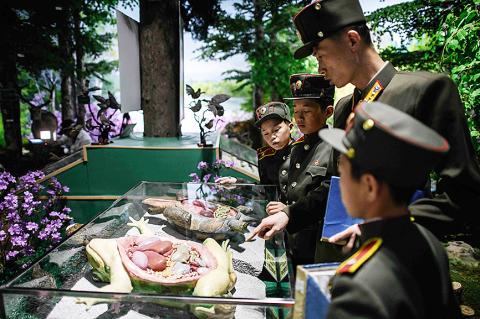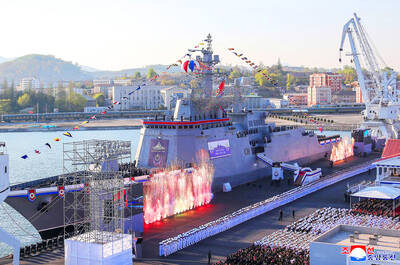Not many schools have classrooms equipped with tanks, jet fighter simulators and grenade launchers, but North Korea’s Mangyongdae Revolutionary School for boys is no ordinary establishment.
Originally set up by North Korea’s founder, Kim Il-sung, to educate the orphans of those killed in the fight against Japanese colonial rule, it has evolved to become the nation’s top school and one of the institutions that knits the ruling elite together.
A bronze statue of Kim and his son and successor, Kim Jong-il, embracing pupils overlooks the playing field, and the corridors are lined with weapons identification posters.

Photo: AFP
One room is crammed with small arms, another holds a tank with moving caterpillar tracks and shooting is a key subject, with training taking place on an electronic range.
The 1,000 shaven-headed boys wear a military-style uniform said to have been designed by Kim Il-sung’s mother, Kang Pan-sok, a red line down their pants symbolizing their devotion to the cause of revolution.
After graduating, they will all go into the military.
There are six 45-minute classes a day, with half of the curriculum devoted to politics and ideology, almost one-quarter on military subjects and the rest for traditional academic disciplines.
Afternoons are reserved for physical activities, with the boys screaming encouragement in the weight room of the well-equipped gym or performing impressive topless taekwondo tumbles.
A girls’ school named after Kang stands in the Pyongyang suburb of Chilgol, where she was born.
The schools are a Kim family project: the North’s founder visited 118 times, his wife 62 times, their son 94 times and his son, North Korean leader Kim Jong-un — who was educated in Switzerland — has been six times so far.
“The Supreme Leader comrade Kim Jong-un is the true parent of all our revolutionary schoolchildren,” said Lieutenant Choe Su-gyong, a guide to the school museum, where photographs show then-Zairean dictator Mobutu Sese Seko and then-Romanian president Nicolae Ceausescu visiting, as well as then-Benin president Mathieu Kerekou, whose sons attended.
With the Japanese colonial period now decades in the past, entry into the school has been broadened to those who have at least one parent or grandparent deemed to have been a loyal servant of the state.
Beyond the Kim family, the top echelons of North Korean society are a self-perpetuating ruling class.
“The North Korean elite is remarkably closed to outsiders; it is hereditary to a degree which would be inconceivable in any other communist country,” Korea Risk Group director Andrei Lankov said.
Pyongyang says its citizens are equals, but classifies them by sociopolitical background according to a hereditary system known as songbun, with loyalty to the authorities a crucial factor.
Only those with good songbun can expect to secure a place at a top university or permission to live in Pyongyang, although the advent of private business is now opening up opportunities for others.
When the school was founded in the early days of the Democratic People’s Republic of Korea, it copied the Soviet Union’s Suvorov military schools for veterans’ orphans.
At the time, there were four main factions in the ruling Workers’ Party: the partisans who had fought alongside Kim Il-sung, domestic communists, those who had been exiled in China and Soviet Koreans.
A series of purges left Kim Il-sung’s trusted comrades-in-arms as the unquestioned top flight.
“Then the function of the school changed,” Lankov said, attributing its prominence to “the militarization of North Korean society in the 1960s and emergence of the quasi-religious cults of the guerrillas, who are essentially presented as apostles to Kim the Great.”
Even so, its appeal might be waning, he added.
“The great-grandchildren of tough and rustic guerrillas have grown spoiled and do not appreciate the tough and simple values of their forebears,” Lankov said. “They would prefer to study foreign languages and computer programming, rather than handguns and ways of killing a human with only a short knife.”

TRUMP EFFECT: The win capped one of the most dramatic turnarounds in Canadian political history after the Conservatives had led the Liberals by more than 20 points Canadian Prime Minister Mark Carney yesterday pledged to win US President Donald Trump’s trade war after winning Canada’s election and leading his Liberal Party to another term in power. Following a campaign dominated by Trump’s tariffs and annexation threats, Carney promised to chart “a new path forward” in a world “fundamentally changed” by a US that is newly hostile to free trade. “We are over the shock of the American betrayal, but we should never forget the lessons,” said Carney, who led the central banks of Canada and the UK before entering politics earlier this year. “We will win this trade war and

Kehinde Sanni spends his days smoothing out dents and repainting scratched bumpers in a modest autobody shop in Lagos. He has never left Nigeria, yet he speaks glowingly of Burkina Faso military leader Ibrahim Traore. “Nigeria needs someone like Ibrahim Traore of Burkina Faso. He is doing well for his country,” Sanni said. His admiration is shaped by a steady stream of viral videos, memes and social media posts — many misleading or outright false — portraying Traore as a fearless reformer who defied Western powers and reclaimed his country’s dignity. The Burkinabe strongman swept into power following a coup in September 2022

‘BODIES EVERYWHERE’: The incident occurred at a Filipino festival celebrating an anti-colonial leader, with the driver described as a ‘lone suspect’ known to police Canadian police arrested a man on Saturday after a car plowed into a street party in the western Canadian city of Vancouver, killing a number of people. Authorities said the incident happened shortly after 8pm in Vancouver’s Sunset on Fraser neighborhood as members of the Filipino community gathered to celebrate Lapu Lapu Day. The festival, which commemorates a Filipino anti-colonial leader from the 16th century, falls this year on the weekend before Canada’s election. A 30-year-old local man was arrested at the scene, Vancouver police wrote on X. The driver was a “lone suspect” known to police, a police spokesperson told journalists at the

North Korean leader Kim Jong-un has unveiled a new naval destroyer, claiming it as a significant advancement toward his goal of expanding the operational range and preemptive strike capabilities of his nuclear-armed military, state media said yesterday. North Korea’s state-run Korean Central News Agency (KCNA) said Kim attended the launching ceremony for the 5,000-tonne warship on Friday at the western port of Nampo. Kim framed the arms buildup as a response to perceived threats from the US and its allies in Asia, who have been expanding joint military exercises amid rising tensions over the North’s nuclear program. He added that the acquisition